
"7-0-5" or "Seven-O-Five" or "705" is an instrumental composed by Glenn Miller in 1943. The instrumental was performed by the Army Air Force Orchestra under the leadership of Capt. Glenn Miller in 1943-1944 and in 1945 under Sgt. Jerry Gray.

"7-0-5" or "Seven-O-Five" or "705" is an instrumental composed by Glenn Miller in 1943. The instrumental was performed by the Army Air Force Orchestra under the leadership of Capt. Glenn Miller in 1943-1944 and in 1945 under Sgt. Jerry Gray.
"7-0-5" was composed by Glenn Miller and arranged by Jerry Gray. The instrumental was performed with the Army Air Forces Training Command Band in several different versions and was recorded for release as a V-Disc. A V-Disc test pressing was made from the November 10, 1945, recording of "7-0-5" with the matrix code VP 375 D7TC-7335. The title "7-0-5" refers to the number of the score in the Glenn Miller music library. Each score had a number in the system that Miller and his arrangers devised. It was published as "Rock and Ride". The other titles that were used for the composition included "Goofin' Off" and "Jivin' the Blues". No title was decided upon so the score number was retained.
"7-0-5" was performed, recorded, and broadcast on the I Sustain the Wings radio program, Program No.15, on May 5, 1944, and on November 10, 1945. [1] The May 5, 1944 Glenn Miller recording was on the 1996 album Glenn Miller: The Secret Broadcasts on RCA Victor. The instrumental also appeared on the 1995 compilation album Glenn Miller: The Missing Years. Volume One: American Patrol on the UK Avid Entertainment label. The 1945 version appeared on the 1992 UK album Major Glenn Miller's Army Air Forces Overseas Orchestra: American Patrol, Vol. II on Magic Records as DAWE55. The instrumental also appears on the 2012 CD and mp3 compilation album The Glenn Miller Band Honors US Troops by the WNTS Corporation.
Larry O'Brien and the Glenn Miller Orchestra recorded the song on the 2006 album Steppin' Out. Wersiking recorded a version of the instrumental in 2009 on a Wersi Helios and Yamaha Tyros. The Glenn Miller Orchestra Scandinavia performed the song as part of the "Christmas Show with the Glenn Miller Orchestra" at Stockholm's Konserthus in Sweden in 2013. The Cornerstone Jazz Trio recorded the song in 2003 and released it on the album One for the Road featuring Larry O'Brien and Nick Hilscher. The Glenn Miller Orchestra under Nick Hilscher performed the instrumental at the 44th Annual Glenn Miller Festival in Clarinda, Iowa held from June 6-9, 2019. [2]
"7-0-5" was featured on the December 4, 1943 Uncle Sam Presents radio program as a "ride-out" and again on February 5, 1944. Instrumentals were featured as closing songs after the main theme was performed. These were recorded together with the rest of each program and at the same session. The Uncle Sam Presents programs were recorded at NBC for the Office of War Information (OWI) and were broadcast for allied service personnel on the OWI "Voice of America" shortwave service and local OWI and Army radio globally. [3]

Alton Glenn Miller was an American Big band trombonist, arranger, composer, and bandleader in the Swing era. He was the best-selling recording artist from 1939 to 1942, leading one of the best-known big bands. Miller's recordings include "In the Mood", "Moonlight Serenade", "Pennsylvania 6-5000", "Chattanooga Choo Choo", "A String of Pearls", "At Last", "(I've Got a Gal In) Kalamazoo", "American Patrol", "Tuxedo Junction", "Elmer's Tune", "Little Brown Jug", and "Anvil Chorus". In just four years, Miller scored 16 number-one records and 69 top-10 hits—more than Elvis Presley and the Beatles did in their careers.

Glenn Miller and His Orchestra was an American swing dance band formed by Glenn Miller in 1938. Arranged around a clarinet and tenor saxophone playing melody, and three other saxophones playing harmony, the band became the most popular and commercially successful dance orchestra of the swing era and one of the greatest singles charting acts of the 20th century.

Gordon Lee "Tex" Beneke was an American saxophonist, singer, and bandleader. His career is a history of associations with bandleader Glenn Miller and former musicians and singers who worked with Miller. His band is also associated with the careers of Eydie Gormé, Henry Mancini and Ronnie Deauville. Beneke also solos on the recording the Glenn Miller Orchestra made of their popular song "In The Mood" and sings on another popular Glenn Miller recording, "Chattanooga Choo Choo". Jazz critic Will Friedwald considers Beneke to be one of the major blues singers who sang with the big bands of the early 1940s.
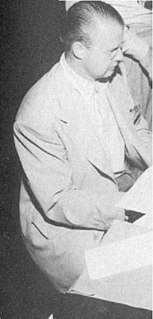
John Chalmers MacGregor, better known as Chummy MacGregor, a musician and composer, was the pianist in The Glenn Miller Orchestra from 1936 to 1942. He composed the songs "Moon Dreams", "It Must Be Jelly ", "I Sustain the Wings", "Doin' the Jive", "Sold American", "Cutesie Pie" in 1932 with Bing Crosby and Red Standex, and "Slumber Song".

"Moonlight Serenade" is an American swing ballad composed by Glenn Miller with subsequent lyrics by Mitchell Parish. It was an immediate phenomenon when released in May 1939 as an instrumental arrangement, though it had been adopted and performed as Miller's signature tune as early as 1938, even before it had been given the name "Moonlight Serenade." In 1991, Miller's recording of "Moonlight Serenade" was inducted into the Grammy Hall of Fame.
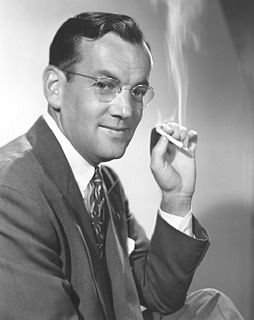
Between 1938 and 1944, Glenn Miller and His Orchestra released 266 singles on the monaural ten-inch shellac 78 rpm format. Their studio output comprised a variety of musical styles inside of the Swing genre, including ballads, band chants, dance instrumentals, novelty tracks, songs adapted from motion pictures, and, as the Second World War approached, patriotic music.
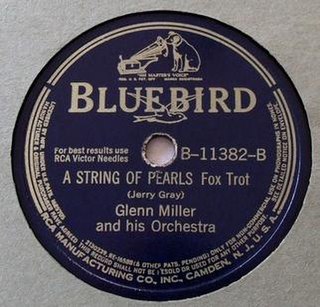
"A String of Pearls" is a 1941 song composed by Jerry Gray with lyrics by Eddie DeLange. It was notably recorded by Glenn Miller and His Orchestra on RCA Bluebird that November, becoming a #1 hit. The song is a big band and jazz standard.

"I'm Headin' For California" is a 1944 song composed by Glenn Miller and Arthur Malvin and performed for radio broadcast. The song was released in 1946 as a 78 single by the Glenn Miller Orchestra led by Tex Beneke. The song was Glenn's last composition.

After Perry Como left the Ted Weems Orchestra in late 1942, he returned to his home in Canonsburg, Pennsylvania with the idea of going back to his barbering profession. Como had many offers before and after he was back in his home town. As he was preparing to sign a lease to re-open a barber shop, he received a telephone call from Tommy Rockwell, who was with General Artists Corporation. Rockwell, who also represented Ted Weems, offered Como a sustaining (non-sponsored) radio program on CBS and also to get him a recording contract. The offers made by Rockwell meant remaining in New York to perform with no more road tours as had been the case for many years when Como was with both Freddie Carlone and Ted Weems. On the advice of his wife, Roselle, Como agreed to go to New York as it meant he could continue working in the music business and not be separated from his family.

Sometime is a 1939 song composed by Glenn Miller, Chummy MacGregor, and Mitchell Parish and performed for radio broadcast only. The song was never recorded in the studio but was performed live for remote radio broadcast on the Mutual and Blue Network from the Meadowbrook Ballroom in Cedar Grove, New Jersey.
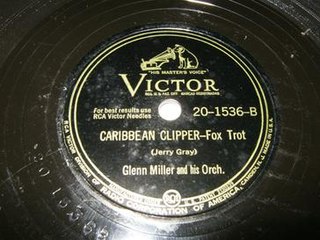
"Caribbean Clipper" is a big band and jump song recorded by Glenn Miller and his Orchestra in 1942. The song was composed by Jerry Gray with lyrics by Sammy Gallop. The song was part of a number of songs—including "Sun Valley Jump", "Here We Go Again", "The Spirit Is Willing", "The Man in the Moon" and "A String of Pearls"—written by Gray, a member of the Glenn Miller Orchestra as an arranger, specially for Glenn Miller, who recorded it in 1943. The song was registered with the United States Copyright Office on October 23, 1942, by the Mutual Music Society.

"I Sustain the Wings" is a 1943 big band and jazz instrumental co-written by Glenn Miller. The instrumental was the theme for the eponymous radio program broadcast on CBS and NBC from 1943 to 1945.

"Moon Dreams" is a 1942 jazz and pop song composed by Chummy MacGregor and Johnny Mercer. The song was first recorded by Martha Tilton on Capitol Records.
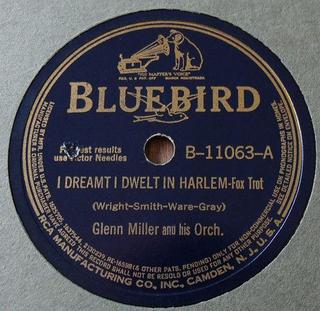
"I Dreamt I Dwelt in Harlem" is a 1941 jazz and pop song recorded by Glenn Miller and His Orchestra. The song was released as a 78 single on RCA Bluebird by Glenn Miller.

"It Must Be Jelly " is a 1942 jazz and pop song recorded by Glenn Miller and His Orchestra. The song was released as an RCA 78 single by Glenn Miller in 1944. Woody Herman also released the song as a single and as a V-Disc.

"Here We Go Again" is a swing jazz instrumental recorded by Glenn Miller. The song was released as a 78 single.

"Elmer's Tune" is a 1941 big band and jazz standard written by Elmer Albrecht, Dick Jurgens and Sammy Gallop. Glenn Miller and his Orchestra and Dick Jurgens and his Orchestra both charted with recordings of the composition.

"Harlem Chapel Chimes" is a 1935 jazz instrumental composed by Glenn Miller. The song was released as an A-side 78 single by the Dorsey Brothers Orchestra.
"The Technical Training Command" is a 1943 big band and jazz song performed and co-written by Glenn Miller. The instrumental version was a theme for I Sustain the Wings, the radio program broadcast on CBS and NBC from 1943 to 1945.